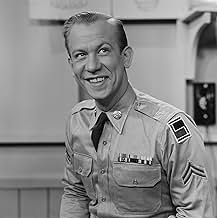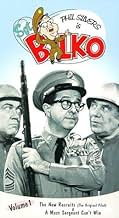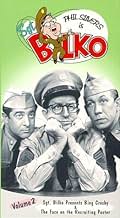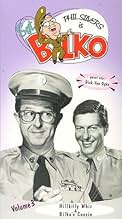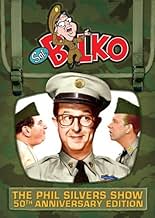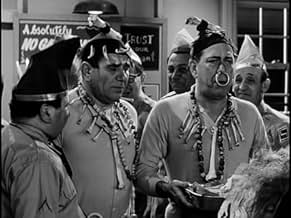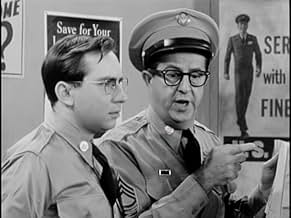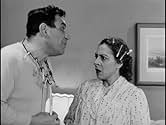Ajouter une intrigue dans votre langueMaster Sergeant Bilko, regularly helped by the soldiers at Fort Baxter's motor pool, spends little time performing his duties by constantly trying to obtain money through various get-rich-qu... Tout lireMaster Sergeant Bilko, regularly helped by the soldiers at Fort Baxter's motor pool, spends little time performing his duties by constantly trying to obtain money through various get-rich-quick scams and promotions.Master Sergeant Bilko, regularly helped by the soldiers at Fort Baxter's motor pool, spends little time performing his duties by constantly trying to obtain money through various get-rich-quick scams and promotions.
- A remporté 8 prix Primetime Emmy
- 10 victoires et 10 nominations au total
Histoire
Le saviez-vous
- AnecdotesPaul Ford often forgot his exact lines, which allowed Phil Silvers to improvise during many of the scenes between Sergeant Bilko and Colonel Hall. Both men always stayed in character however, it was usually the other actors in the scene who laughed, ruining the scene.
- GaffesSgt. Bilko routinely wore his decorations incorrectly, and differently from one show to the next. He nearly always wore his Combat Infantryman Badge with the lower wreath overlapping the top row of ribbons; the lower edge of the CIB should always be about 1/4" above the top edge of the top row of ribbons. Also, he nearly always wore a unit commendation ribbon centered below his other ribbons, just below the top edge of his left breast pocket flap; unit commendation ribbons on Army uniforms were worn just above the top edge of the right breast pocket flap (although that style of "Class A" uniform is now long obsolete). Also, Bilko sometimes wore a unit commendation ribbon above the pocket flap of his right breast pocket, and sometimes wore the same ribbon below that same pocket flap; all unit commendation ribbons on Army uniforms were worn together, just above the right breast pocket flap.
- Citations
MSgt. Ernest G. Bilko: You said "but". I've put the finger on the whole problem. You're a "but" man. Don't say "but". That little word "but" is the difference between success and failure.
- ConnexionsFeatured in Salute to Stan Laurel (1965)
Therefore, we had a nation full of Mothers and Fathers roughly aged mid 30's to late 40's who together with their "Boomer" offspring , found that material relating to the "War" (or the Military in general) and the 1930's seemed to be favourite topics of 1950-60's TV Series. Hence we saw the great successes of shows like COMBAT, NAVY LOG, and THE UNTOUCHABLES.
It was during these years that the "Service Comedy" became a staple for the sitcom. This format of being on the inside of the Armed Forces, no doubt has its genealogy traceable back to eras far before any electronic media of TV, Radio or the Movies. Indeed, we can no doubt find the embryonic beginnings of the Service Comedy among the works of Mr. W. Shakespeare and company.
As for our own research, we believe the direct Ancestor or "Missing Link" between the Service Comedy Feature Film and the Service TV Sitcom "evolved" over at Hal Roach Studios' "Laugh Factory". "Streamliner" was his name for his approximately 55 minute film. This put them in between feature and a 2 or 3 Reeler (short subject).
During his period that Roach Studios gave us t of the World the "Streamliner" Series of Eight SGT. DOUBLEDAY Movies (1941-52). The comedies featured the misadventures of Sgt. Dorian "Dodo" Doubleday (Mr. Tracy) and everybody's Screen Sergeant, Joe Sawyer as Sgt. William Ames. The two made a splendid film comedy team; with their whole often hilarious interplay's being the friction between the two.
On the one hand, Sgt. Ames (Mr. Sawyer), was the gruff, self made Army career-man and Blue Collar type. College man, Sgt. Doubleday (Tracy), on the other hand, was the "90 Day Wonder" type. His character was representative of those called-up in 1940's first ever Peace Time Draft in U.S. History. It was guys like this who got promoted from PFC to Corporal and Sergeant on the Fast Track. This of course created animosity with the veteran career men as represented by Sgt. Ames (still Joe Sawyer).
So, this brings us to the 1950's and the Golden Age of Television. During this time and up to 1958 and the dawn of Videotape, a series was either on film (regular or Kinescoped) or it was live. And pre-dating BILKO by three months (June '55 to September '55) was Bud Yorkin's THE SOLDIERS on NBC. The Series which was most likely slotted as one of those old Summer Replacement series, a status from which it never would matriculate to the higher level of Regular Series University. (Too bad; as it had shown a sort of adult humor promise. No, Schultz, I didn't mean 'Blue Humor.')
So it was after this we were inundated with the likes of McHALE'S NAVY, BROADSIDE (a female version of McHale), ENSIGN O'TOOLE, NO TIME FOR SERGEANTS (Broadway, Movie & TV), GOMER PYLE, U.S.M.C. and even F TROOP. Oh, yeah, by the way, we almost forgot THE PHIL SILVERS' SHOW.
SERGEANT BILKO hit the CBS TV Network 1n September of 1955 and remained a staple until 1959. Its main feature was in giving the Army's Enlisted Men, Non Coms and Officers foibles, equal to or far surpassing everyone in Civilian Life. In the fictional Kansas locale of Fort Baxter, the Motor Pool Platoon is run by con-man and old War War II Veteran Master Sergeant Ernest Bilko (Phil Silvers). He runs the motor pool in whatever time he can squeeze-in between hatching whatever get rich schemes that his always grifting little head can conceive.
The now middle-aged Ernie Bilko also sees himself as quite a Ladies' Man and many of the weekly episodes involve his on base girlfriend, some visiting beauty or even both.
Some of our favourite episodes in volved: a.the Platoon's getting a Chimpanzee through an Army physical, Bilko's being audited by Uncle Sugar and the Sgt.'s getting to see himself as others do vs. what he thinks of himself.
Aiding and abetting in this was a great, if somewhat elderly players doing the men of Bilko's Motor Pool Platoon as well as others in the Fort Baxter Command. Starting from the top we have the C.O., Colonel Hall (outstanding Paul Ford), Sergeant Grover (Signal Corps, Jimmy Little*) and Mess Sergeant Rupert Ritzy ( hilarious Joe E. Ross), Cpl. Barbella (Harvey Lembeck), Cpl. Henshaw (Allan Melvin), Pvt.'s Duane Doberman** (Maurice Gosfield), Dino Paparelli (Billy Sands), Pvt. Gander, Cpl. Fender (Herbie Faye) and others.
As an example of a truly strange anecdote of the BILKO Show; they were assigned a young Officer by the Army Brass as Technical Adviser. The Captain was asked to do an on-camera appearance as an M.P., which he reprised several more times. The Captain's name was George Kennedy! Ya gotta start somewhere, Schultz!
NOTE: * Mr. Nat Hiken had great admiration for the Old Time Vaudeville & Burlesque Comedians. He proved so by casting guys like Jimmy Little and Joe E. Ross (both former Burlesque Comics) in not only the SGT.BILKO Series, but also in CAR 54, WHERE ARE YOU?
NOTE: ** In a most unusual of merchandising, National Comics Publications (aka Superman/DC) not only published a SGT. BILKO Comic Book; but also spun-off a second title, SGT. BILKO'S PRIVATE DOBERMAN!
- redryan64
- 24 janv. 2008
- Lien permanent
Meilleurs choix
- How many seasons does The Phil Silvers Show have?Propulsé par Alexa
Détails
- Date de sortie
- Pays d’origine
- Langue
- Aussi connu sous le nom de
- You'll Never Get Rich
- Lieux de tournage
- sociétés de production
- Consultez plus de crédits d'entreprise sur IMDbPro
- Durée30 minutes
- Couleur
- Mixage
- Rapport de forme
- 1.33 : 1
Contribuer à cette page


